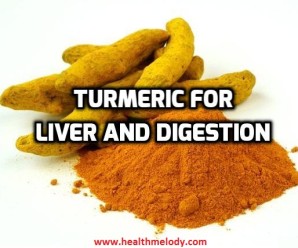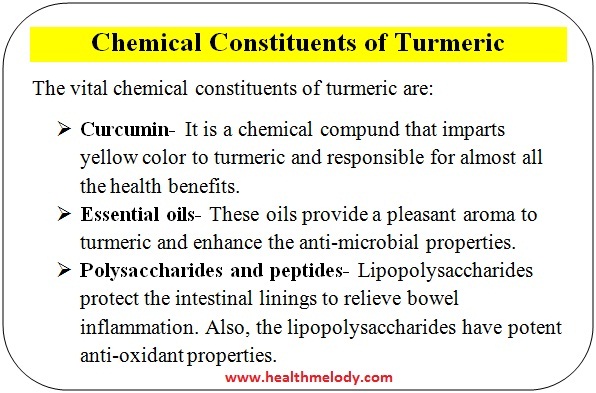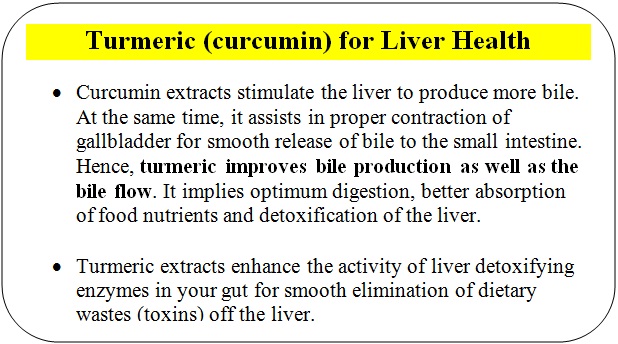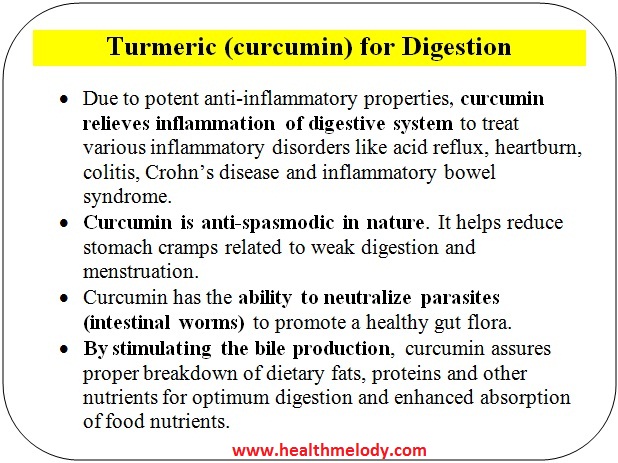
Turmeric for Liver Cleanse and Indigestion
The traditional Indian (Ayurveda) and Chinese health systems widely acknowledge the use of turmeric for liver cleanse and indigestion.
Turmeric is certainly the best natural herb to sort out all your liver and digestive tract related disorders- safe, effective, economical and easily available.
Let us know Turmeric
Turmeric is a yellow colored spice- native to India and other South Asian countries. It is used liberally as a regular spice to make curries and other daily meals in India. It provides the soothing yellow color to the meals and enhances the taste as well.
Going beyond culinary purposes, it is used as a symbol of prosperity, fertility and purity in Hindu weddings and religious ceremonies.
Turmeric is a plant herb that belongs to ginger family. It is a slightly pungent peppery taste and pleasant aroma.
Medicinal properties of Turmeric
Most of the health benefits of turmeric are due to a powerful medicinal compound- curcumin. Curcumin, along with other plant chemicals is responsible for the yellow color of turmeric as well.
In Ayurveda, turmeric is used as a potent medicinal plant herb to treat liver ailments, indigestion, skin disorders, joint pain and fungal/ bacterial infections.
Not only Ayurveda, turmeric has impressed the modern medical science as well. According to a report published in the health journal- Food and Chemical Toxicology, Sept 2005- more than 7000 published articles have highlighted the anti-oxidant, anti-inflammatory, anti-bacterial and anti-cancer properties of curcumin (turmeric) extracts.
The National Institutes of Health, USA- the largest biomedical research agency in the world- suggests that curcumin possesses potent anti-oxidant, anti-inflammatory and anti-cancer properties. Though, more human studies are required to establish a concrete conclusion.
An article published in the Journal of American Association of Pharmaceutical Scientists, Jan 2013- summarized the therapeutic uses of curcumin (turmeric) on the basis of clinical trials conducted over the past half century. According to this article, use of turmeric has been found useful to treat various health conditions such as:
- Liver disorders such as jaundice
- Indigestion
- Stomach ulcer
- Inflammatory bowel syndrome
- Crohn’s disease
- Alzheimer’s disease
- Obesity
- Cancer- colon cancer, pancreatic cancer, breast cancer, prostate cancer
- Brain disorders
- Inflammatory skin problems such as Psoriasis and eczema
- Arthritis
Turmeric for Liver cleanse
Liver is the largest internal organ of the human body. Let us quickly rewind the major functions of liver:
- It cleanses the blood.
- Produces bile- a digestive fluid- that helps breakdown fats and other food nutrients for proper digestion. It also facilitates the optimum absorption of food nutrients.
- Eliminates metabolic wastes (toxins) out of the body through bowel movements. Liver is the chief eliminatory organ of the human body, responsible for elimination of toxins off the body.
Hence, there is no doubt that liver is a vital internal organ and it must work smoothly for optimum health and fitness.
How turmeric can help here?
As discussed above, bile is a vital digestive fluid- produced by liver and stored in the gallbladder. When required, bile is released towards the small intestine to breakdown the dietary fats. It assures proper digestion and absorption of food nutrients.
The bile liquid while flowing from liver to small intestine to large intestine (colon)- mixes with all the cholesterol residues and wastes (toxins) and excrete them out through bowel movements.
Hence, optimum bile production and smooth bile flow is mandatory for smooth digestion and uninterrupted elimination of body wastes.
A case study published in the magazine- Alimentary Pharmacology and Therapeutics, Feb 2009- suggested that curcumin extracts when consumed everyday can stimulate the gallbladder contraction for smooth bile flow.
Turmeric for Indigestion
In both- Ayurveda and traditional Chinese medicine- turmeric is considered a digestive stimulant and often recommended for chronic digestive weakness.
Research Studies- Turmeric for Liver Cleanse and Indigestion
A research study published in the magazine- Liver International, Apr 2007- studied the impact of turmeric extracts on liver cirrhosis (damage). The diabetic rats were fed 300 mg/kg/day of turmeric extracts for a period of 12 weeks. It resulted in significant protection against liver cirrhosis mainly due to anti-inflammatory properties of curcumin.
Another paper published in Liver International, Nov 2009 discussed the pharmacological actions of turmeric extracts in liver disorders and suggested more human trials (case studies) for universal recognition of turmeric as a liver protecting herb.
A paper published in the magazine- La Clinica Terapeutica, Vol 4, 2014- discussed the use of curcumin extracts to treat diabetes induced liver damage. Curcumin extracts improve the liver metabolism and enhances the tissue regeneration of liver.
An animal (rat) study performed by South Korean researchers found that curcumin extracts have a protective action against the liver damage induced by carbon tetrachloride.
A research study published in the British Medical Journal- Gut, Mar 2010- concluded that feeding turmeric to mice reduces the inflammatory responses that can cause liver damage and scarring. In comparison to a normal (non turmeric) diet, daily feeding of turmeric for 4 weeks clearly showed better liver health and functioning.
A case study published in the magazine- Plant Sciences Research, Vol 3, 2011- found that oral consumption of turmeric can help treat peptic ulcer. A total of 35 patients suffering from peptic ulcer were administered 2 grams per day of turmeric. After 8 weeks, almost all the patients got relieved from peptic ulcer.
Good to Know- Anti-Obesity Activity of Turmeric
Obesity is a pro-inflammatory health condition. Turmeric is a well known anti-inflammatory natural herb. Also, turmeric extracts aids in proper breakdown of accumulated body fats by stimulating bile production. Hence, regular consumption of turmeric extracts can aid in obesity treatment.
A review article published in the magazine- Annual Review of Nutrition, Aug 2010- suggested that turmeric can be used as a natural supplement to treat obesity along with positive changes in diet and lifestyle.
Daily Dosage
The chief medicinal compound in turmeric is curcumin. The optimum dosage of curcumin extract per day is around 1200 mg per day.
Curcumin content in turmeric is only 3%. It implies- 1200 mg of curcumin is equivalent to 40000 mg (40 grams) of raw turmeric powder.
To consume 40 grams (20 teaspoons) of turmeric powder every day is literally an impossible task.
Well, don’t lose heart. There is a way out for it!!
You can easily get curcumin extract supplements (capsules) in the market which can be consumed with plain water- preferably warm water.
How to consume
For digestive and liver problems, consume curcumin extract capsules 20 to 30 minutes before the meals.
Note:-
If you are not convinced enough to invest some money in curcumin extract capsules and just want to try turmeric powder. Then consume at least 5 teaspoons (10 grams) of turmeric powder per day so that you can get around 300 mg of curcumin. Anything less wouldn’t yield any significant impact.
Take it with water or mix it in your green juice/ smoothie or sprinkle on the food preparations. Raw turmeric powder is bitter in taste, but, tolerable.
You can make your own lemon-ginger tea with added turmeric powder. Take a cup of warm water, squeeze half lemon and a few drops of ginger juice in it. Now, add 2 teaspoons of turmeric powder, stir well and drink it. Drink this tea twice a day.
Side effects/ Precautions
Turmeric is a routine spice used for culinary purposes in India and nearby South Asian countries. Millions of people add turmeric in their daily food preparations. Hence, turmeric is a safe natural herb for people of all ages.
According to a clinical trial reported in the magazine- Anticancer Research, Aug 2001- oral consumption of curcumin extracts up to 8000 mg per day regularly for three months was found completely safe.
For some people, consuming more than a few teaspoons of turmeric powder can cause temporary side effects such as stomach cramp, nausea, vomiting and diarrhea.
For below health conditions, prior doctor’s consultation is strictly advised:
- Pregnancy– Consuming turmeric as a spice is completely safe during pregnancy. But, high dosage of curcumin extracts can stimulate uterus contraction resulting in premature labor and menstrual flow. It can eventually cause miscarriage.
- Diabetes– There are research studies to prove the effectiveness of curcumin for diabetes treatment. But, sometimes, high dosage of curcumin can lower the blood sugar below safety the limit to complicate the problem.
- Kidney stone and gallstone– High dosage of turmeric can worsen the gallstone pain by stimulating gallbladder contraction. Similarly, it can increase the concentration of oxalates in urine to worsen kidney stone symptoms.
- Surgery– Turmeric is anti-coagulant in nature- slows down the blood clotting process. Hence, it may cause extra bleeding during or after the surgery.
From where to buy
You can buy curcumin extract capsules from a chemist shop near to you or check Amazon for some discounts:
If you are from USA, click here to check
If you are from India, click here to check
If you are from UK, click here to check
Final words
Use of turmeric for liver cleanse and indigestion is well quoted in various text manuals of Ayurveda and traditional Chinese medicines. Consuming curcumin extract supplements along with a healthy diet and positive lifestyle would help sort out your digestive tract related issues in a safe and effective manner.
References
https://www.nih.gov/about-nih
https://www.ncbi.nlm.nih.gov/pubmed/17355460
https://www.ncbi.nlm.nih.gov/pubmed/10102956
https://www.ncbi.nlm.nih.gov/pubmed/19811613
https://www.ncbi.nlm.nih.gov/pubmed/25203338
https://www.ncbi.nlm.nih.gov/pubmed/10813555
https://www.ncbi.nlm.nih.gov/books/NBK92752/
http://www.reuters.com/article/us-turmeric-liver-idUSTRE62N03Z20100324
https://www.ncbi.nlm.nih.gov/pmc/articles/PMC3144156/





